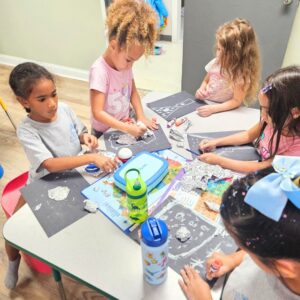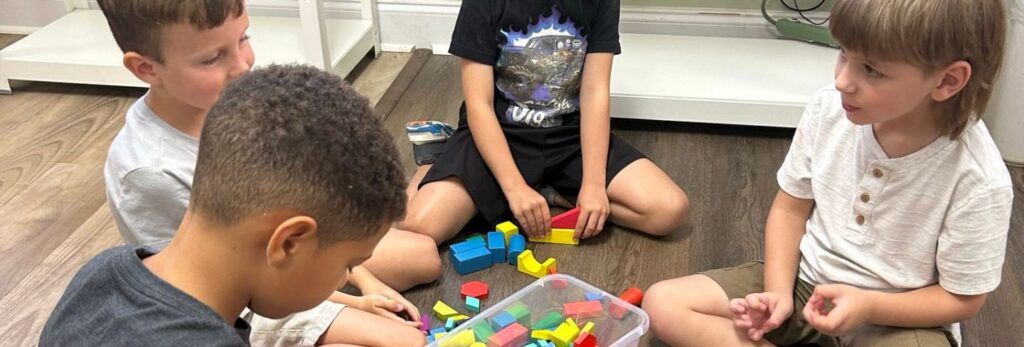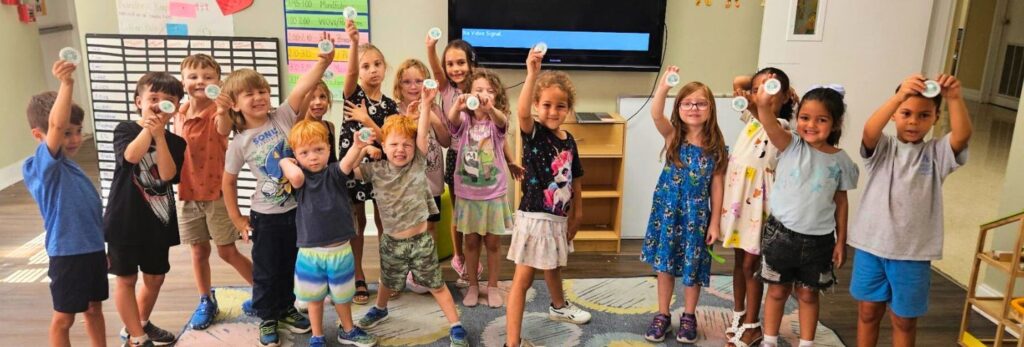Enter your info below to download our free guide "10 Questions to Ask When Touring Schools"
As kindergarten approaches, many parents feel a mix of excitement and anxiety. You want your child to be prepared — to thrive in the classroom, make friends, and feel confident in their abilities. And it’s natural to think of readiness in terms of academics — letters, numbers, and sight words. But in 2025, we know so much more about how young children learn. True readiness goes far deeper than memorization or early testing.
What if “readiness” isn’t just about letters and numbers? What if the most important preparation has more to do with play, curiosity, and emotional maturity than with academics?
Rethinking What School Readiness Really Means
Parents today know more than ever about how children learn. You’ve seen firsthand that your child learns best when they’re curious, joyful, and engaged — not when they’re pressured to meet arbitrary academic milestones. Yet the school system often asks the opposite of us: sit still, follow instructions, stay quiet, and master content that may not be developmentally appropriate.
It’s time for a mindset shift.
When choosing a school, ask yourself: why stifle a child’s natural love of learning so young? Pushing too hard, too early, often backfires — leading to frustration, resistance, or disinterest. True readiness isn’t about who can read first or add the fastest. It’s about nurturing confidence, curiosity, and a belief in one’s own ability to learn.
Many of the Common Core standards — like identifying sight words or understanding simple addition — are easily mastered by most children once their brains are ready and motivated to do so. When we allow children the time and space to develop foundational skills like focus, fine motor control, and emotional regulation, the academics come naturally and often, more rapidly. In fact, studies have shown that children who start academics later but are developmentally ready learn faster and retain more than those pushed too soon.
So rather than asking, “Is my child academically ready?” — try asking, “Is my child curious, confident, and emotionally grounded enough to love learning when it begins?” Because those are the skills that truly matter.
Why Play Is Foundational for Learning
Play is not the opposite of learning; it is how children learn. Through play, they develop resilience, curiosity, and the ability to collaborate and solve problems. It’s how children develop executive function, creativity, and emotional intelligence. According to the American Academy of Pediatrics, play supports brain development in ways that structured academics cannot. When children play, they practice problem-solving, self-regulation, and social awareness — skills essential for both school and life.
Fine motor skills like gripping a pencil, tying shoes, and cutting paper also develop through play — long before a worksheet can teach them. So when a child is building with blocks, they’re not just “playing” — they’re developing spatial reasoning, dexterity, and persistence.
- Emotional and Self-Regulation: Play gives children space to navigate frustration, disappointment, and triumph in real time. According to the AAP’s Power of Play report, this process strengthens emotional resilience and self-control.
- Social Skills and Empathy: Cooperative play teaches communication, negotiation, and conflict resolution. Children learn to share ideas, compromise, and see others’ perspectives.
- Cognitive Growth: Unstructured play boosts executive function, flexible thinking, and problem-solving — skills that predict later academic success (NAEYC, 2022).
- Fine Motor and Spatial Skills: Activities like building, drawing, and cutting develop hand-eye coordination and fine motor control — essential for writing and math readiness.
When children engage in open-ended exploration — from stacking blocks to building elaborate pretend worlds — they’re not “just playing.” They’re wiring their brains for focus, creativity, and emotional intelligence.
The Role of Social & Emotional Growth
Emotional readiness is just as critical as cognitive readiness. Learning to share, handle disappointment, and recover from mistakes builds the resilience children will draw upon their entire lives. A child who feels emotionally safe and connected learns faster and takes more risks in their thinking. Conversely, a child who feels pressure or fear of failure will often shut down curiosity to avoid mistakes.
That’s why early education should prioritize community, emotional regulation, and opportunities for children to make choices and see their impact. These moments of ownership are where real confidence is born.
The Risks of “Too Much Too Soon”
Between birth and age six, a child’s brain undergoes explosive growth, forming millions of new neural connections every second. This period lays the foundation for attention, language, motor coordination, and emotional regulation. During this time, play—not academic drill—provides the richest environment for cognitive and social growth.
Neuroscientists now understand that the prefrontal cortex—responsible for planning, emotional control, and decision-making—develops primarily through active exploration and social play. When children build, pretend, negotiate, and imagine, they’re strengthening the very systems that make academic learning possible later on.
Research from the American Academy of Pediatrics (AAP) emphasizes that play fosters self-regulation, language, social-emotional skills, and executive function—the essential skills children need to learn effectively. Forcing structured academics too early can actually limit the neural flexibility and curiosity that drive long-term success.
Children who enter structured environments too early often struggle not because they lack intelligence, but because their executive functioning—focus, impulse control, and persistence—hasn’t had enough time to develop through meaningful play experiences.
When early learning environments emphasize academic achievement over play, children may experience anxiety, reduced creativity, and lower motivation. Studies from the National Association for the Education of Young Children (NAEYC) show that overemphasis on formal instruction in preschool and kindergarten can lead to burnout, decreased curiosity, and weaker social-emotional skills later on.
As Harvard’s Graduate School of Education notes, unstructured play strengthens executive function—the foundation for lifelong learning, creativity, and self-control. When children have time to explore freely, they’re building the tools they’ll later use to problem-solve, collaborate, and thrive in academic settings.
What Families Can Do
- Prioritize unstructured play: Give your child daily opportunities for open-ended exploration, indoors and out.
- Encourage independence: Let your child pour their own drink, zip their backpack, or set the table — small acts that build confidence and self-reliance.
- Talk about emotions: Help your child name feelings and brainstorm ways to handle them.
- Model curiosity: When they ask a question, reply with, “What do you think?” and explore the answer together.
- Value process over perfection: Celebrate effort, curiosity, and persistence more than correct answers.
A Better Way Forward
Because the goal isn’t to get ahead — it’s to build a foundation for a lifetime of learning, curiosity, and joy. At Apollo Academy, we honor the whole child — mind, body, and heart. Our learner-driven approach nurtures the skills that matter most in the early years: curiosity, self-regulation, confidence, and compassion. Once those roots are strong, mastery follows naturally — and beautifully.
Learn More About Our Spark Studio
A place where play and purpose work hand in hand to prepare children not just for school, but for life.
Enter your info below to download our free guide "10 Questions to Ask When Touring Schools"
Ready to see what a joyful start to school looks like?
References & Further Reading
-
- Yogman, M. et al. The Power of Play: A Pediatric Role in Enhancing Development in Young Children. American Academy of Pediatrics, 2018. Read more.
- The Power of Playful Learning in the Early Childhood Setting. National Association for the Education of Young Children (NAEYC), 2022. Read more.
- Harvard Graduate School of Education. Summertime, Playtime: Why Unstructured Play Is Critical for Children’s Development. 2018. Read more.

















